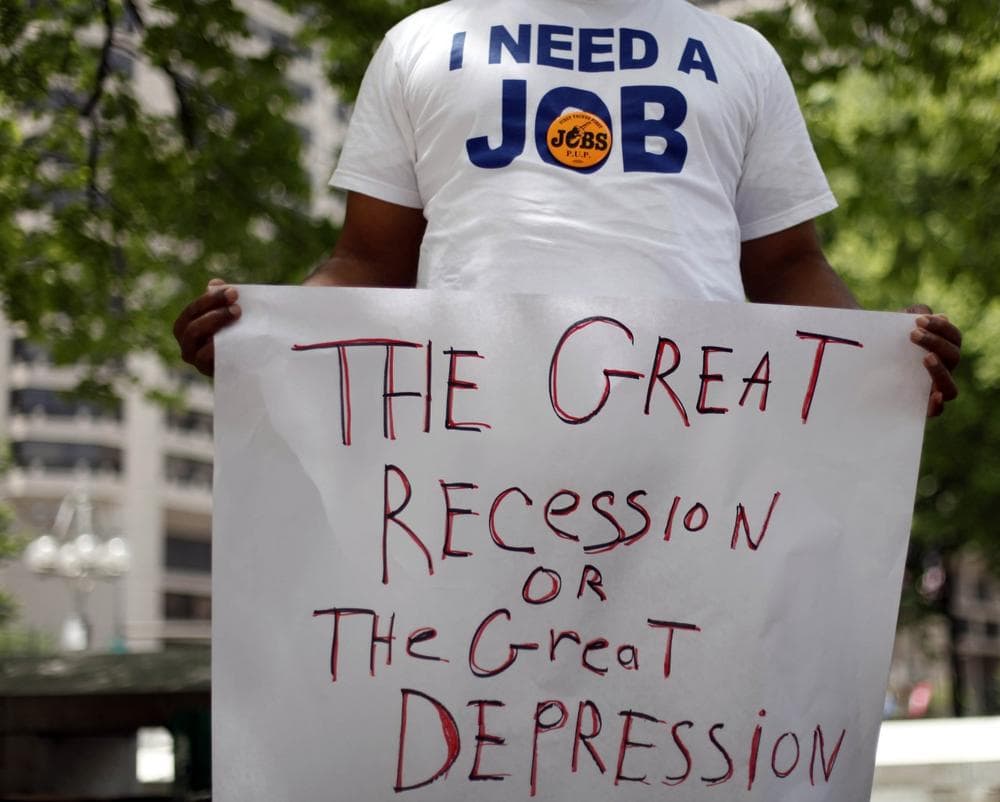Advertisement
Long After Recession's End, Deep Layoff Scars May Remain

I went back to visit my old parking lot at The Boston Globe this week. For more than six years, I commuted to the Globe along the crawling traffic of the Southeast Expressway, travel mug in hand. But what I remember most about that parking lot is crying in it.
It was 2009. The Globe was in a major financial crisis, like much of the country. Brian McGrory, then the Metro editor, had just called me in to his office to warn me that I was almost certainly about to lose my job.
I held it together in his office, but then when I came out into the parking lot to call my best friend, I felt a wave of shame and insult engulf me. I knew better, but for just that moment, I felt — worthless.

Well, that's no surprise, right? Everybody knows it hurts to lose your job. But what has caught me by surprise is that even though my family didn’t suffer much financially from my layoff, and even though I tend to be pretty upbeat and resilient, and even though I’ve landed well, it still hurts. More than four years later, I’m still not fully over it.
At work, I feel hypervigilant -- as if nothing I do is ever enough, or good enough, to feel safe. At home, making life plans fills me with anxiety.
Which makes me wonder: Are these feelings normal? And if so, what does that mean for the roughly one-quarter of American workers who were laid off at some point during the recent recession?
These days, the Dow is hitting record highs. Housing is hot again in many spots. More and more, the Great Recession of 2009 is becoming just a bad memory. Except that, like other bad experiences, for many of us it may have left emotional scars that last.
Advertisement
So are we going to end up something like the forever frugal survivors of the Great Depression?
"One of the things you find about depression babies, as we call them — that is, people who came of age in the great depression — is that they retained a characteristic skepticism about good times. They never believed them," said Prof. Bruce Schulman, an American historian who is chair of the Boston University history department.
“They were the people like my grandparents who always reused teabags. Even when they went out to a restaurant at a prosperous time, to celebrate a great occasion, [they] would take the teabag and drain it out and wrap it up and put it in their purse." It is a generation, Schulman said, that tries always to be prepared for crisis.
Of course, the depression was far worse than the recent recession. But extensive research shows that whether one-third of the population is out of work or only one-tenth, layoffs at any time can have deep and long-lasting effects.
Harvard Business School professor Sandra Sucher says that though virtually everyone faces tough experiences, layoffs can be an unusually damaging kind of life event.

“It approaches my financial health, in the sense of what my income is," she said. "It approaches and is disruptive to my physical health; it can disrupt my mental health and my sense of self; and I think for so many of us, work is a central part of our identity, and so when that is disrupted, that is actually something that layers on top of all these known effects.”
Let’s begin with the financial impact of a layoff, which Sucher says can persist indefinitely.
“One study of workers displaced in a 1981 recession found that they experienced a 30 percent decline in their income at the time of the layoff," she said. "Twenty years later, they were still earning 20 percent less than employees who were not laid off.”
Now for health. The stress of a layoff shoots up your risk of high blood pressure and heart disease. Your risk of depression doubles; your risk of alcoholism quadruples; your risk of committing violence or suicide also rises.
“So these are profound effects," Sucher said. "They don’t, obviously, affect all the people and many of us know people who’ve been laid off and don’t suffer. But the increase in the probability of these effects is enormous.”
And the trouble may not end when you find a new job. The research suggests you might be so driven to produce that the quality of your work suffers. You may play office politics more. Or you might have given up believing that you have any control over whether you keep or lose your job.
So there’s the answer to my wonderings about whether my post-layoff scars are normal: Unfortunately, it seems that I’m in a lot of good company.
What, then, is to be done?
I spoke with Erik Gregory, director of organizational and leadership psychology at the Massachusetts School of Professional Psychology.

His demeanor is so gentle and therapeutic that I found myself telling him that every time I hear the name Brian McGrory — which is fairly often, because he’s now the editor-in-chief of the Globe — I flash back to his warning in 2009, and crying in the parking lot.
Gregory explained that McGrory’s name acts for me like a trigger, “and the trigger brought back some symptoms of the trauma that you experienced.”
I questioned whether what I’d been through was bad enough to be called a trauma. Gregory says a layoff may not be as damaging as war or violence, “but it still has an impact on us as human beings, and it gets encoded in the way we manage the world.”
Psychologists call this "post-dismissal traumatic stress disorder," he said — and that trauma can be reduced if companies lay off workers more carefully, giving them more control and support in the process
“We need to have sense of options," he said, "and when we feel like we have no options, that’s when we move into anxiety and depression, and what psychologists call learned helplessness and learned hopelessness."
"It absolutely has to do with the way organizations let people go," he said, "and there’s a good way, and there’s a way that’s not so good.”
For a positive example, he offered the Canadian government's tactics when it was faced with cut-backs recently: It offered workers respectful choices, including how they wanted to pack up their desks and whether they wanted to use their pension benefits to pay their salaries and keep working for a while.
Layoff trauma can affect whole companies, too. Harvard Business School’s Sandra Sucher says that when workers are laid off, their colleagues can grow fearful and demoralized, disrupting their ability to innovate.
So, she says, it’s both more humane — and smart — to explore alternatives to layoffs, such as salary cuts, furloughs, and buy-outs.
She foresees a movement away from layoffs: “I could imagine, and this is not a fantasy," she said, "that people who have had experiences like this, just like our parents who came from depression environments, basically say, 'Never again.'"
One of her next research projects is to look at employers who avoided layoffs, how they did it and why.
For workers who’ve already been laid off, Sucher says there are many ways they can help themselves heal.
Don't blame yourself or doubt your abilities.
“First is just to maintain a positive relationship with your company and co-workers because you will likely need them as a reference for your next job. A second is not to blame yourself or doubt your abilities. So many layoffs are done as a percentage of head count, and also, quite honestly it doesn’t help you be in a good frame of mind to go after and look for a next job. People have [also] talked about how important it is to look at the layoff as an opportunity to explore alternative career paths.”
Gregory suggested that various forms of therapy can also help, including cognitive-behavioral therapy to help "reframe" how you think about your layoff. (Yes, I'm considering it. Okay, okay, I'll try it.)
I have to say, I kept putting off working on this report because I didn’t really want to delve into this hard emotional stuff — but writing this has helped me, too.
It helps to know that I’m far from alone, not just in being laid off, but in how I feel about it. And it helps that it brought me back to the Globe parking lot. I realized that I don’t miss being there.
Life moves on.
Readers? Feelings to share, questions to ask, about being laid off or seeing it happen to others? Please post them in the comments below.
